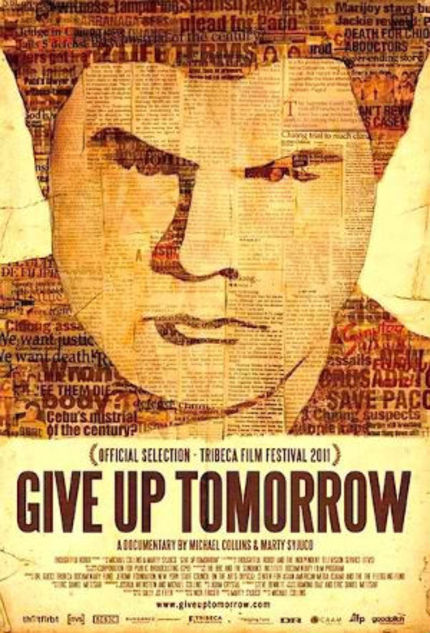Review: GIVE UP TOMORROW Shatters the Official Truth

It should have ended when the Philippines' Supreme Court denied the several Motions for Reconsideration filed by the men who have earlier been convicted for the rape and murder of the Chiong sisters and sentenced to death.
It was supposed to have been a triumph of a justice system beleaguered by accusations of being beholden to the rich and influential. For a time, it was indeed seen as a triumph. For that very little time when the media, in the guise of being one with the overwhelming majority, was celebrating the illusory end to all the questions and issues, the country had a sense that there is indeed order.
It was supposed to have been a triumph of a justice system beleaguered by accusations of being beholden to the rich and influential. For a time, it was indeed seen as a triumph. For that very little time when the media, in the guise of being one with the overwhelming majority, was celebrating the illusory end to all the questions and issues, the country had a sense that there is indeed order.
The convicted men were predictably seen as spoiled scions of the few members of the wealthy elite. The most prominent accused, Francisco "Paco" Larrañaga, is at first glance, the very personification of the country's social divide. With his fair skin, brown eyes, and foreign features, he does not look like most Filipinos. His mother is a distant relative of a former president. His father is a Spanish citizen. His gazes are intense, almost angry. He talks with a cadence that is too assured and easily mistakable as indifference and arrogance. His eventual fall from grace, starting from his celebrated arrest to that final conviction by the highest court of the land, is therefore the logical happy ending to the escapist entertainment that the case has evolved into.
Director Michael Collins and producer Marty Syjuco's Give Up Tomorrow presents the fatedly intertwined stories of the Chiongs and the Larrañagas from a specific perspective, that of those closer and more intimate to the perceived victimizers than the victim. At first glance, the obvious tilt to sympathize with Paco seems problematic as it clouds the documentary, pushing it further away from being a portrait of a frustratingly neglected truth into something that resembles propaganda. As it turns out, the documentary, with its skillfully presented pieces of evidence that pertains to the alleged miscarriage of justice, serves both purposes seamlessly.
The documentary's strongest sequences are those that featured real footage from the prolonged trial, edited together with various interviews with shelved witnesses and emotional relatives, unflinchingly revealing the folly that was instantaneously believed and consumed in the heat of the moment. The film's most sobering moments are those depicting Paco, from when he was snatched from the good life up to several years after when he is still serving a sentence for a crime he allegedly did not commit, insisting on his innocence, mouthing the mantra from which the title of the documentary was borrowed. Its portrayal of the two mothers, one whose obsession with her being a victim has allowed her to mold the system to suit her cause and the other whose trust in the system had turned herself and her family into its unsuspecting victims, is at once astounding and melancholic.
As it methodically shatters the official truth as narrated and explained by the various decisions of the trial and appellate courts, it also shatters the precious comfort and security that the processes that came up with the official truths provide. As it navigates the glaring flaws of a distinct judicial system through the experiences of Paco, it exposes the immense cracks of any system or institution tasked to retain both order and justice that is created and run by corruptible and erring men. More than swaying sympathies towards the already maligned convicts, Give Up Tomorrow espouses vigilance, especially in this age where truth is easily adaptable to the needs of the powerful.
Give Up Tomorrow acknowledges the gravity and importance of its cause, skirting away from too much style and spectacle and focusing instead on the scope and breadth of its material. Despite its very straightforward presentation, it is an admittedly difficult film to sit through. It is immensely heartbreaking, balancing the indelible pain of seeing an entire system that for years has been entrusted to set things right shamelessly crumble and being asked to accept the very possible reality that an innocent man has wasted his best years in jail, all for the benefit of keeping a tumultuous mob sated.
(Cross-published in Lessons from the School of Inattention.)
(The film has screened at numerous festivals, including Cinemalaya 2012. In the U.S. it will be broadcast on PBS on October 4, 2012.)
Give Up Tomorrow
Director(s)
- Michael Collins
Writer(s)
- Michael Collins
- Eric Daniel Metzgar
- Marty Syjuco

Do you feel this content is inappropriate or infringes upon your rights? Click here to report it, or see our DMCA policy.





